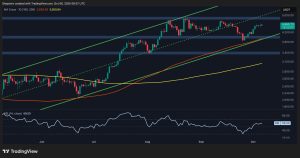It’s not every day that a seasoned cybersecurity player turns their back on a lucrative career spanning multiple organizations and projects, but Jorge Sebastio is exactly that.
Sebastio, the former CTO of EcoSystem at Huawei Technologies, is an experienced cybersecurity executive with experience in AI, Blockchain, Cloud Computing, Cyber Security, Disaster Recovery, Big Data, and other managed services professionals focused on building business value.
He has—across his career—delivered advice in several AI, ML, ICO, STO with a comprehensive understanding of technology disruption effects caused by both Artificial Intelligence and blockchain technology, and has since worked on crypto-centric projects across the Middle East and Canada.
Today, Sebastio caught up with Alex Fazel, the host of crypto edutainment channel Cryptonites, to discuss all things crypto, his start in the space, predictions for the next few years, and a plethora of other insights with different perspectives.
Below are some snippets from the 30-minute segment!
On how did Sebastio get started in crypto
“This happened within Huawei. About seven years ago, [a boss] asked me to please look into ‘blockchain.’ And maybe we can use that as a use case because obviously, Huawei is an engineering organization. Originally, they were only in cellular towers and telecom billing systems. Eventually, they moved into it. So they were making servers, storage, cloud computing, AI, because you need to go about and promote this technology, and need to have use cases.”
“One of those use cases was blockchain. And more specifically, making blockchain service and offered within their platforms. We were looking at things like hyperledger and so on, obviously nothing to do with crypto, or crypto coins or anything else. It was really blockchain as a service for enterprise organizations, which is still a very niche
Sent usage of blockchain. And I think a lot of growth is still happening in this area.”
On smart contracts and vulnerabilities
“Typically, in a piece of code, you have a vulnerability for or a bug for every 1000 lines of code. And you have one critical version release for every 10,000 lines of code. So if you have a very large smart contract, there’s a chance there are things that are not correct, or could be putting your smart contract at risk.”
“So that really means it created a whole new field of cybersecurity. It was the field to audit the smart contracts and make sure that they are safe, that there are no risks associated with them. Because the smart contracts run 100% in the blockchain, so that means there’s no way to stop in the middle of their execution unless you kind of freeze the entire blockchain.”
“Now, there’s new updatable smart contracts. Technology has evolved. And obviously, this gave birth to a whole new world. I sometimes call this world, the world of the virtual bank or other people called ‘DeFi’ or distributed finance. But with this attention comes risk due to security. So obviously, this needs to be addressed in a structured way, too. So the business of auditing smart contracts became very serious and very real.”
On NFTs and protecting luxury items
“NFTs is actually a particular area that definitely has got a lot of growth in the last one or two years. There are many areas, of course, there were CryptoKitties, which was a little bit fun, but also profitable for some people. Actually, a lot of the NFTs came from the gaming world. So people play games, they get superpowers or they get away.”
“But beyond that, there are many other applications. One of the latest ones is football cards, very similar to the old days where he had baseball cards. So if the football card is from a famous player, the guy’s got very good attraction on the market, then this card becomes more valuable because it’s unique.”
“Again, you can trade it as a piece of art. Now, we can also tokenize the real art could be a painting like Mona Lisa, or another. So that really means the NFT works in combination with the art or is even the art itself.”
“There are other cases where the NFT is also being used to identify valuable objects, like for example, a Rolex watch or others. So that means it’s become kind of you can say the serial number of that object of luxury. So there are many luxury brands that I’ve explored and are today using NFTs. So that you can use the NFT to validate that the ledger object is actually real and not the fake one. NFTs are actually taking off, and I see lots of future applications.”
The post Talking DeFi farming and ‘luxury’ NFTs with crypto thought leader Jorge Sebastio appeared first on CryptoSlate.




















